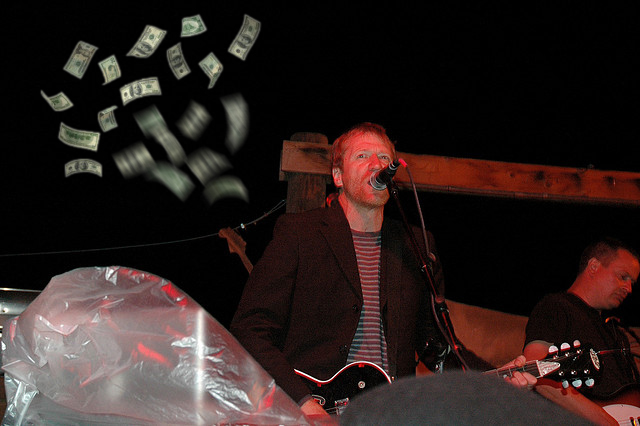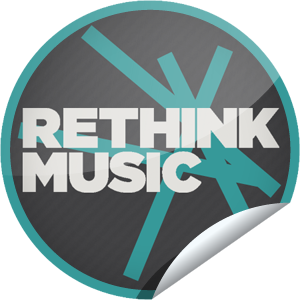
A small but growing number of formerly well-compensated musicians are rallying around a new empty catch phrase: “ad-sponsored piracy”.
As far as I can tell, this idea gestated in the bitter womb of The Trichordist, an echo chamber for musicians who are too scared of changes in technology to discuss solutions. Instead, they spew dangerous propaganda about the “new exploiters” of musicians, namely technology companies. Though they continually remind readers that they’re “fighting for the artist”, though there seems to be no sort of plan or strategy other than complaining.
Look, I think we can all agree all types of businesses exploit people on a fairly regular basis. But I believe I’ve made it clear that technology companies are more ethical that the business forces that dominated music in the past. They are far from perfect, but at least they’re trying to find solutions.
The Trichordist went way out on a limb, grabbing screenshots of ads from major corporations being displayed alongside free music downloads of popular artists. This shock-and-awe tactic is presumably to incite fans to petition the advertisers to pull their ads from these sites.
Unsurprisingly, this attempt has backfired horribly. When the Dead Kennedys and Lou Reed posted the aforementioned Trichordist posts on their Facebook pages, their fans were quick to point out how stupid the posts were, and how out of touch Trichordist and the artists (or more likely, their embittered management) were for posting them.
Eric Kennedy wrote on the Dead Kennedys page: “…that shit is from a year ago, and I can pretty much guarantee that site doled out more viruses than songs. Stick to reposting whatever Black Flag is posting on FB in the future.”
Jay Conner added: “It is utterly astounding that somebody directly involved in the industry on both the business and artistic sides could be this uneducated about how internet advertising works. Particularly since he, you know, runs a blog dedicated to the internet and its ethics.”
Here’s the problem with so-called “ad-sponsored piracy”: it’s a mythical threat. It’s a fake problem cooked up by butthurt musicians who saw their market share crumble when the music business model shifted away from charging for access to recorded music.
I don’t have to get long-winded to prove it. Anyone with a basic understanding of how Internet advertising works understands that these ads appearing on these sites does not equate to companies sponsoring the site or its contents. It’s doubtful they even know where 99% of their ads appear.
And even if they did, anyone with a basic understanding of copyright law and how the Digital Millennium Copyright Act works knows that any site that makes available copyright infringing material must remove it immediately at the request of the rights holders. Reed and the Kennedys can play the victim all they want, but if they feel their copyrights are being infringed, they do have legal recourse to deal with it. Instead they are just complaining, and their fans are totally turned off by it.
Furthermore, even if we assume these sites were committing copyright infringement, most people understand that copyright law — and much of society, really — has been hijacked by corporate interests. In reality, free access to music is a good thing for most musicians because a chance to be heard is a chance to be paid. Pre-Internet, very few artists were heard, a minority were paid, and a tiny minority were paid fairly.
In fact, I think Lou Reed and Dead Kennedys would actually benefit from having their music available as a free download, largely by tech-savvy young people. If you look at the artistic merit of both these artists, I think popular opinion would agree they’ve been on the decline creatively or at least nowhere near the work they’re widely known for. Let’s say nine out of ten kids might come along and download “Walk on the Wild Side” and they hate it, or they like it but not enough to be curious about discovering more Lou Reed tunes (purely hypothetical, because kids stream music these days). One out of ten is going to love it so much they’ll seek out more, and along the way there will be plenty of opportunities to pay the artist far more than what they would make selling the track on iTunes to ten kids. That’s the new business of music, and it’s a much more fair shake for musicians than one given by the labels, lawyers and lobbyists of the past.
As for the Dead Kennedys? I’m sorry, but they’re not the Dead Kennedys if Jello isn’t in the band. He’s on record calling the band a ‘cash scam’ and that’s what the band is purely about now: making money. The art is gone. Forget musicians, fans are being exploited.
So you see folks, the myth of “ad-sponsored piracy” is really just the product of desperate musicians at the end of their careers. The primary purpose of copyright law is to create a rich and thriving culture — economic compensation is a part of it, but not the whole. Why would we deny thousands of musicians the right to be heard and to be paid just so washed-up artists like Dead Kennedys and Lou Reed (more accurately, their buisiness teams and labels) can squeeze some more dollars out of a good run that happened decades ago.
If The Trichordist were serious about fighting against musician exploitation, they would be fighting against the corporate corruption of copyright and fighting for Internet freedom. By their rationale, even Spotify qualifies as ad-sponsored piracy because of its almost non-existent royalty payments in the face of hundreds of millions of dollars of ad and subscriber revenue. But Spotify pays 70% of revenue to artists, just like iTunes. Somehow one is morally bankrupt and the other perfectly legitimate. It’s absurd. I’m no great champion of Spotify, but put up against iTunes they look like Mother Theresa. And like I said, music downloads are approaching their high water mark and will be all but a memory as a new generation grows up on streaming, so the myth is already hopelessly outdated.
In the future, I would like to see The Trichordist discussing some actual solutions instead of throwing tantrums. Talk amongst yourselves. I’ll give you some topics:
• Building a culture of entrepreneurship among musicians
• Crowdfunding as a way to finance an album without signing an exploitative contract with a label
• Marketing as discovery, not as manufacturing popularity or generating music sales
• Music for music’s sake, not as a product but as a service
• How digital services for musicians democratize the industry
• How digital technology dramatically cuts the expense of music production and marketing

